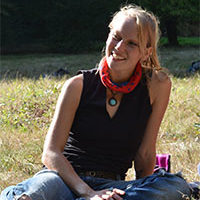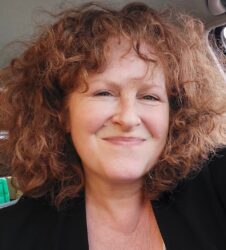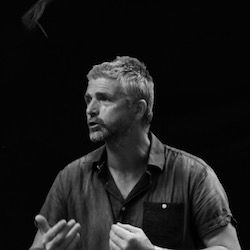Exploring the power of radical nature connection and ecological learning for collective action
This Training for Trainers, hosted in DEvon (UK). aims to support trainers, facilitators and educators who want to use nature-based and eco-systemic approaches of education and facilitation for activists and change makers seeking to empower defence of the earth and struggles for social justice.
As we witness the global system of industrial growth-based production collide with non-negotiable ecological limits, the need for collective action in defence of the earth and social justice has never been clearer. We are interested in how nature connection, ecopsychology, and ecological education can all play a part. Those of us who practice such work know how deeply transformative it can be and how it can offer insight, healing, connection and deep shifts in perspective. What can we do to make it more effective and powerful as a stimulus and support to social and ecological action and the deeper transformations needed? For those of us facilitating social and political change making, how do we weave a more embedded, participatory and ecological understanding into our work? And how do we ensure that when working with these ecological and nature-based modalities we don’t inadvertently repeat the patterns of harm we’re trying to change?
Join us on this training for trainers to find out and to learn how to weave this approach into your own practice.
Nature-based practice can support us to reclaim a healthy and integrated sense of self – rooted in the ecological, biological, sensory, and emotional, as well as rational dimensions of our lives. It helps us to reconnect with the sources of nourishment and inspiration that can flow into us from the web of life. And at its most potent, it can support deep shifts in perspective and experience that take us beyond narrow human-centred views of the world with the gradual emergence of what is sometimes called “ecological consciousness”.
Drawing from a wide range of sources, this training seeks to facilitate a deepened inquiry and exploration for participants in relation to their own practice, and support them to facilitate this for others. It offers experiences and content for fresh learning, as well as the unlearning of outdated modes and ideas, allowing the possibility of new forms of activism.
This work applies the benefits of nature connection – such as greater clarity, resilience, vitality, motivation, and connection with self and others – to leverage social change. It seeks to harness direct experiences of an ecological paradigm to the radical transformation of our relationships with the world in ways that are radical, explicitly anti-oppressive and politically informed. It offers ways to bring a taste of more beauty, relational and care based organising, pre-figuring the worlds we long for without denying the troubles.
There will be time spent indoors and out, in whole and small groups, solo and in pairs. We will create space to discuss key challenges we face as practitioners, to share experience and approaches and practise the application of the content and methods. There will be opportunities to bring live issues, projects or ideas to the learning community and trainers.
Guiding questions include:
Who is it for?
This training will not cover basic facilitation or pedagogical training; rather, it is intended to offer additional skills and content to existing training and facilitation skills. Whilst you don’t need to have experience of nature facilitation, we do ask that you have some form of existing personal nature connection practice that you wish to integrate into your training or facilitation work. To participate fully in this training, you will need to feel comfortable enough outdoors to be outside in all weathers and are happy to get a bit muddy!
As a framework for this inquiry, we will share work recently developed by the Radical Nature Connection team from the Ulex Project alongside Toni Spencer’s work in related fields. It is supported by research work carried out by the German ecopsychology collective, Wandelwerk, and input from the ecopsychology perspectives from Vedeglet (Hungary).
Please Note: Participation in this training will involve a little bit of preparatory work. Once accepted we will send more information and some invitations to reflect on your practice, and what you wish to learn (or un-learn) by joining us. There will be some minimal pre-reading.
This training is part of a Europe-wide collaborative project inquiring into how nature connection, ecopsychology, and ecological education can empower collective action for socio-ecological transformation. This includes the production of open-source resources for facilitating this work, this training for trainers event and a trainers manual. Partners include Ulex, Transformative Education CIC, Wandelwerk and Vedeglet.
The Venue: On The Hill is located in the beautiful Teign Valley in South Devon, who provide land-based experiential learning opportunities to a wide range of people.We will be working in their large cob barn and in various parts of this landscape of hill and valley, food growing and wilder spaces. Accommodation will be in bell tents with mattress and duvet with a few options for live in vehicles or solo camping. Some different needs can be accommodated but the site is not yet fully accessible. More details available on request.
Food will be mainly grown on site – cultivated and wild and mainly vegan.
We are offering this event in the spirit of the ‘solidarity economy’, meaning that no-one will be excluded based on economic grounds. Attendance is ‘free of charge’. But please, to help support the economic viability of the event, consider making a donation to contribute to the costs and to support others on very low incomes. (Unfortunately we are unable to provide economic support towards travel to the event).
In the solidarity economy:
(See details of our approach to radical economics here)
Contact us
to apply

Location:
Kara is a facilitator of socio-ecological regeneration. As an educator, Kara devised and co-developed ‘Radical Nature Connection’ as an approach and co-holds this strand of work at Ulex. Kara delivers courses and lectures on Masters degrees on radical, decolonial approaches to nature connection, rewilding and ancestral skills (with a focus on foraging, tracking and trees) at the Centre for Alternative Technology, Schumacher College and independently. Kara works as a freelance writer and is active on socio-environmental issues within grassroots movements, and spends the Winter months working in conservation forestry, restoring ancient woodlands. Kara runs a Wild Recovery program for people recovering from addiction and chairs a charity that runs the 350-acre Cambrian Wildwood project, which is restoring wild habitats in the Cambrian foothills and creating access to immersion in wild nature.

Location:
Toni works with WildWise (‘Being Nature’ and Call Of The Wild), Ulex, The Emergence Network and Tough Cookie amongst others. She has an Action Research based MSc in Responsibility and Business Practice and is trained in a range of facilitation modalities; embodied awakening, deep ecology, trauma informed leadership, The Work That Reconnects. She says that her work as a facilitator, consultant, artist and mentor “seeks to support a homecoming to presence within the context of modernity. In the face of increasing socio-ecological crises, how can we follow the cracks in the dominant paradigm and listen to the wilder margins? How does this inform our work as activists, educators and community builders? What does Deep Adaptation, solidarity and decoloniality look like? Feel like? Taste like?” These question and more inform her poetry, pedagogy and prefigurative practice.
Other recent clients and collaborators include Schumacher College, St Ethelburgas, the Transition Town Movement and Encounters Arts. She is the founder of [the pause… in practice] and Acornucopia (The Feral Kitchen).

Location:
G has been involved in social movement organising and education since the late 1980’s. He is a highly regarded trainer and has designed numerous training programmes covering areas such as psychosocial resilience in activism, the ecology of social movements, and leaderful organising. As a founding member of the Ulex Project, he is known for highly innovative work blending pedagogical methodologies. This holistic approach to activist learning has inspired numerous training initiatives across Europe. He currently steers the strategic development of the Ulex Project and its social movement capacity building programme.

Location:
An Maeyens (she/her) is a facilitator and trainer with over two decades of experience in grassroots movements. She specialises in creative, inclusive agenda design and brings deep expertise on group culture, power dynamics, and transformative learning. Starting of in the anti-globalisation movement she has trained thousands in civil disobedience, supported international coalitions, and developed multilingual training programmes and toolkits. Her work spans movements, cultures, and countries, guided by a commitment to care, accessibility, and leaderful organising.

Location:
Ari’s activism began in 2002, at age 16, as a Bosnian refugee in Canada, where they founded and coordinated a group for LGBTIQ high school students and allies. They were a co-founder and leader at kolekTIRV in Croatia and Trans Network Balkan, involved in community organizing, advocacy, program management, team coordination, capacity building, education, media work, campaigns, events, fundraising, etc. In 2024, they joined the Supervisory Board of the Croatian Trade Union Collective of United Precarious Workers and Activists (SKUPA).
Beyond the Balkan region, Ari served as a Board member at Transgender Europe (TGEU), where they held roles as Secretary, Treasurer, and later Co-chair. They have also been a trainer with the Center for Artistic Activism and served on the Advisory Committee and since 2022 as a Community Care Facilitator at FRIDA — The Young Feminist Fund. Since 2024 they are the Operations Manager at Global Philanthropy Project.

Location:
Sergio (all pronouns) was born in Romania and migrated to Germany in the early 2010s. In the past, he was a social worker with homeless people and a social consultant for Eastern European migrants for various organisations. Trained as a filmmaker, he spent two years making a documentary about the ‘civic reawakening’ in Romania and the waves of protest it brought with it. In connection to this, Sergio is currently co-steering the development of an online open-source participative knowledge production platform on activism in Romania. Over the past nine years, Sergiu has offered his skills to various journalists, grassroots collectives and campaigns, mostly working within the labour rights, climate justice, international solidarity and anti-authoritarian movements in Germany and Romania. Nonetheless, his biggest focus since 2020 has been his work as an organiser with the anarcho-syndicalist Free Workers Union, where he focuses mostly on organising Romanian migrant workers on construction sites, in factories and in the agricultural field.

Location:
Linzy Na Nakorn is a movement director, politicised somatics practitioner, community organiser and facilitator. For the past decade she has been facilitating movement, body work and creating theatre, dance and participatory performance that advocates for and organises with communities in pursuit of housing, disability and racial justice. Her movement practice focuses on trauma-informed approaches to building resilience, capacity and joy via way of the body for personal, interpersonal and community sustainability. Linzy was a Co-Director of The Big Ride for Palestine in partnership with The Gaza Sunbirds, Native Woman Ride and Middle East Children’s Alliance; using cycling as a tool for mobilising active solidarity and in support of campaigning for the rights and self-determination of the Palestinian people. Linzy is part of a UK network of activists and artists advocating for Radical Care – supporting organisations, researchers and institutions to work towards system change in societal approaches to labour, leadership and access.

Location:
Jeroen (he/him pronouns) has been involved in grassroots social movements for more than two decades now, starting back when he was fifteen. Throughout the years the fights for “climate justice” and “migrant justice” have been consistently on top of the list of struggles that make his heart beat faster. A key transformative moment for Jeroen was reading Paulo Freire’s Pedagogy of the Oppressed. Freire’s revolutionary pedagogy gave him a language to support the creation of emancipatory learning environments, rooted in a desire for collective liberation. Jeroen has also been exploring in depth Boal’s Theatre of the Oppressed and Joanna Macy’s The Work That Reconnects among other methodologies to build his trainer’s toolkit. Inspired by the liberatory possibilities of these traditions, he started an organization with a friend, LABO vzw, based in Belgium, where he has worked as a trainer and campaigner between 2013 and 2023.

Location:
Ella brings more than 10 years’ external experience working with not for profit and community based organisations across diverse themes including: advocacy for migrant communities; local community engagement in national policy making; and structural relationships between poverty and disenfranchisement, and education and poverty. Immersed in critical theory in her early 20s she brings a holistic and questioning approach, and is passionate about systemic solutions that centre relationship and interconnection between ecology and society. A long standing member of the collective, Ella has been part of the core team since the inception of the Ulex Project. Her work bridges facilitation, developing project partnerships, governance, strategy, operations, and project and programme evaluation. She has developed and overseen more than 70 partnerships with a range of different actors across European social movements.
Ulex: Latin (argelaga Catalan, gorse English) noun:
1. A thorny-evergreen flowering shrub, with a high capacity for regeneration and resilience. Its seedpods open in contact with fire and it reshoots from charred stumps. A successionary plant that grows well under challenging conditions. It improves soil fertility through nitrogen fixing, preparing the way for renewed biodiversity.
2. A traditional choice for igniting fires. Burns hot and bright.
3. A networked project adding nutrition and fertility to European social movements through training and capacity building. It kindles the realisation of social justice, ecological intelligence, and cognitive vitality.